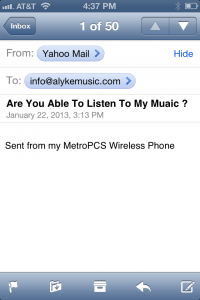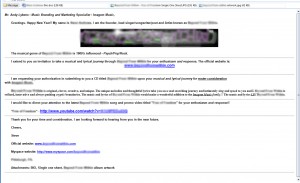What do you mention when talking about what you’re up to musically? Anything! As an indie musician you need to be highly versatile and agreeable to ANYTHING that has to do with music. A friend wants a band to play at a party? Someone else needs a DJ for their wedding? Your boss needs help choosing music for her kids? Yes, yes, and yes.
Get used to saying yes to everything that has to do with music. Even if you’ve NEVER done it before. Even if you don’t have the right equipment. Say YES and figure it out.
This is a key insight into the minds of some of the world’s greatest entrepreneurs. They see someone with a need and find a way to fill that need for that person. Eventually their reputation grows as a problem-solver and soon enough they’re making money – or even building a company – by simply having capitalized on the opportunities all around them.
Here’s how it could work:
Your friend’s friend needs a band to play at a party.
You say YES, figure out what kind of music they want, and do it.
When you go to the party, use it as an opportunity to:
-
a. Talk about your upcoming EP release.
b. Subscribe people to your mailing list.
c. Chat with a few individuals and mention all the capabilities you have as a musician.
d. Say YES to any other opportunities that arise.
Sure, you may get nothing or you might meet a bunch of people who work in accounting firms who seemingly can’t help. However, if you convey your message clearly, it makes your message easy to remember and easily repeatable. They can then relay your skills to their friends. You can see how literally anyone becomes a great new lead. Plus you might need an accountant some day anyway!
Here’s another more basic setting:
Your friend needs some new music for their daily workout.
You say “I know a TON of great workout music, what kind of stuff do you like?”
You put a playlist together, put yourself in the meta-data in iTunes with your email address, and tell your friend to spread the playlist around if they like it.
– This could potentially lead to a few new fans or mailing list subscriptions, or just some new friends-of-friends who loved your choices, who can now think of you when they think of music.
Saying “yes” is also a great way to learn new skills and develop side projects and alternate revenue streams as you pursue your passions – all because your friends know that when they think “music,” they should think of you.
But this email is titled “what to say” and I know how most of you feel when it comes to self-promotion. You think of it as annoying or contrived and it may make you feel uncomfortable. Well the great news is if you’re starting with friends and colleagues conversations are immediately more comfortable.
But the key when talking to anyone is to thinking about talking UP!
U – Updated
P – Positive
This means that everything you say about your career should be some new detail with a positive spin. Let’s say you’re currently trying to find a music publisher. When your friends ask “hey how’s it going” you could respond by saying:
“It’s going really well, thanks for asking! I actually reached out to a few different music publishers last week about my new EP!”
Your friend might ask what a music publisher is, or ask to hear your new songs, or maybe they just change the subject. Whatever they do, if they engage in a conversation later and music comes up, you can bet they’ll say “oh yeah my friend’s in a band – in fact, I think he just recently was talking to a music publisher about his new EP.”
Simple phrases like that go a very long way. From here it’s possible your friend’s friend could want to get in touch and ask how you did what you did. Maybe they need advice because they’re starting to record their own EP. Or maybe it’s something simple like they’re looking for a new guitar player. This means potentially being able to advise them about publishing, helping produce their EP, or getting an extra gig with their band.
Either way you can see how each time you simply mention what you’re working on in a positive way, the response can lead to a situation where your skills become relevant, interesting, and useful.
Why is it so important to be positive?
Well, check out this response to the same question of “how’s it going?”
“Pretty good I guess. I tried emailing some publishers but I haven’t heard anything back yet. It’s really frustrating. The music business is so tough to get into. I’m not even sure my new EP will get listened to by anyone.”
WHOA! Big difference right? This statement sure says A LOT about how you feel about your own music, and how successful your friends perceive you to be. What do you think your friend might say to their friend now? Do you think they’ll relay a simple, positive statement that gets the person they’re talking to interested? Probably not.
Furthermore, how do YOU feel when someone talks to you in this fashion? How does someone who is positive affect you? Start paying attention to it today – you’ll be blown away.
Here are a few more examples of updates you can give to friends when they ask you “what’s going on?”:
- Invites to upcoming live shows (that you’re either playing or attending).
- New gear you bought.
- New songs or bands you love, or how you’re re-discovering a classic (this one is really easy)
- Some new tool you use on the business side of your efforts (maybe you started using Evernote for keeping an archive of industry contacts)
- New songs you’ve written or co-written (feel free to talk UP co-artists too!)
You might even mention that you dig working your day-job because every paycheck brings you 10% closer to your next studio day or an awesome effects pedal or whatever.
Finally, I’d like to talk about when you really don’t want to, or can’t say “yes.” Keep in mind you can always TRY to help. Let’s say someone loves Neil Young and wants to meet him. Well, unless you know Neil or his manager, it’s unlikely you can help, right? But what you might do is head home, hit up the internet and see if you can find a few tips others have used to meet famous people. Then fire off an email with a link.
It might not be an intro to Neil Young himself, but you never know how it can help someone until you try.
Action Step: Write down an example phrase you can use no more than 2 sentences long for each of the 5 examples above. Then, just like you would when working on a song lyric, edit them relentlessly until they are positive, precise, and clear. Start putting one or two of them to use immediately the next time someone asks you “How’s it going?”
We covered a lot in this email, but I hope you found it useful. If you have, please pass it along to a friend, or tweet it and mention my name (@andylykens). I would very much appreciate it!
In the final LHF article we’ll be covering WHO the best people are to find when it comes to advancing your career, and how to find them more quickly through genuine connections to build strong relationships.



 One final point: It comes down to how many people are going to see a project, and how much you value your music, the exposure, and the project itself. If someone wants to license your song for all-media, worldwide in perpetuity (which I would HIGHLY advise against unless you’re running a music library), they’re anticipating a lot of people are going to see it. This means the exposure is high, which is great, but they’re also asking for a lot of rights which means it should be a cost consideration vs. the history of your song.
One final point: It comes down to how many people are going to see a project, and how much you value your music, the exposure, and the project itself. If someone wants to license your song for all-media, worldwide in perpetuity (which I would HIGHLY advise against unless you’re running a music library), they’re anticipating a lot of people are going to see it. This means the exposure is high, which is great, but they’re also asking for a lot of rights which means it should be a cost consideration vs. the history of your song. Today, I’m going to give you some ideas about who might be looking for music and where you can find them. Most of the information you need exists online as far as WHO you need to contact. Here’s a quick rundown of some GREAT resources.
Today, I’m going to give you some ideas about who might be looking for music and where you can find them. Most of the information you need exists online as far as WHO you need to contact. Here’s a quick rundown of some GREAT resources. 
 Video Games – Video games can be a bit trickier, but you have to remember that the people with the coveted positions as music producers and music supervisors have been interviewed, participated on panels, and generally are bombarded with enough attention that digging them up on Google is easy. Give LinkedIn’s search a shot, or try googling the video game company’s name along with “music supervisor” and see what you come up with.
Video Games – Video games can be a bit trickier, but you have to remember that the people with the coveted positions as music producers and music supervisors have been interviewed, participated on panels, and generally are bombarded with enough attention that digging them up on Google is easy. Give LinkedIn’s search a shot, or try googling the video game company’s name along with “music supervisor” and see what you come up with.

